In the opening week of the Division 1 Féminine, Olympique Lyonnais hosted Olympique de Marseille at the Groupama OL Training Centre. A hundred days after Lyon were crowned women’s champions of Europe for the sixth time, with a challenging World Cup in France immediately after, the champions of Europe kicked off their new season with a fresh start. Marseille on the other had make it back this season into the top tier, this from the Division 2.
Lyon’s previous coach, Reynold Pedros, stepped down in June after his second Champion’s league title with Lyon since he took over in 2017. The official statement from the club justified that it was necessary for a change of coach to ‘stimulate a new dynamic’ that will allow the club to regenerate and remain on top. With the new man in charge, Jean-Luc Vasseur and some star signings after the Women’s World Cup, are the Les Fenottes looking on track to greater successes? In this tactical analysis we attempt to provide an analysis of Vasseur’s game model with Lyon and their tactics as they took on a weaker Marseille side.
Lineups
Lyon: Sarah Bouhaddi, Lucy Bronze, Kadeisha Buchanan, Delphine Cascarino, Alex Greenwood, Ada Hegerberg, Amandine Henry, Eugénie Le Sommer, Dzsenifer Marozsán, Griedge Mbock Bathy, Nikita Parris
Subs: Saki Kumagai, Emelyne Laurent, Shanice van de Sanden, Janice Cayman, Wendie Renard, Jéssica Silva, Lisa Weiß
Marseille: Amandine Blanc, Anna Conesa, Marine Coudon, Candice Gherbi, Blandine Joly, Agathe Maetz, Sarah Palacin, Caroline Pizzala, Maëva Salomon, Eva Sumo, Sarah Zahot
Subs: A. Lamarque, Jamila Hamidou, Nadjma Ali Nadjim, Inés Arouaissa, Cindy Caputo, Nora Coton-Pélagie
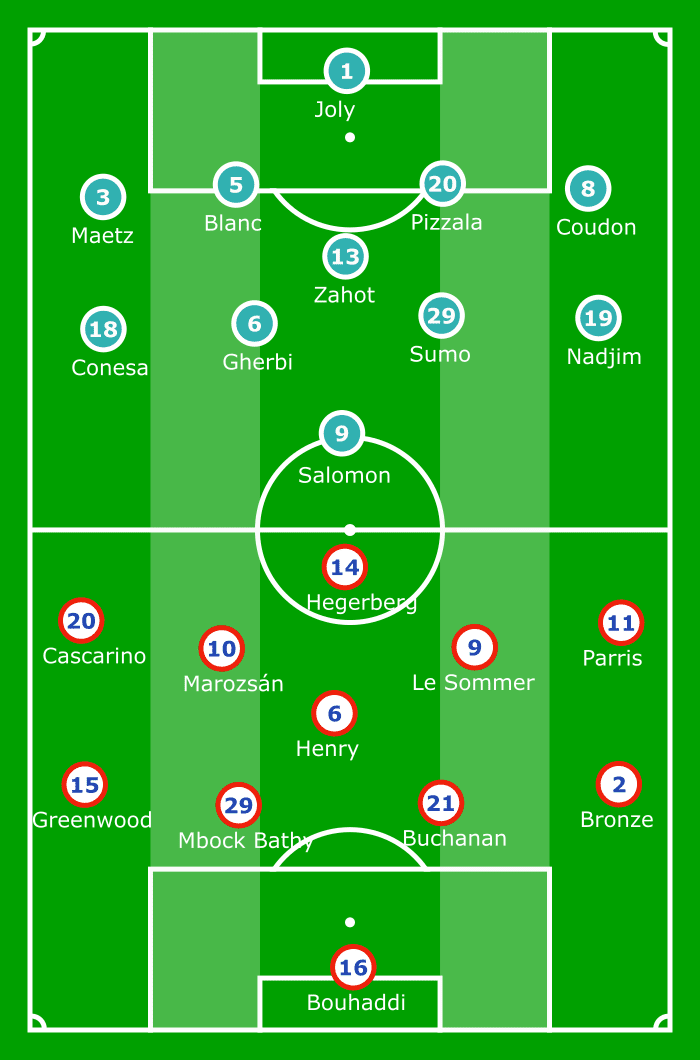
Marseille’s tactics against Lyon
Lyon are definitely the club known to attract the female ‘galacticos’ of football. Throughout the years, they have boasted the big names such as Alex Morgan, Carli Lloyd, and Megan Rapinoe. This season they looked to fortify their roster with some major signings like Manchester City’s England forward, Nikita Parris and Manchester United’s former captain, Alex Greenwood. It was well anticipated that they would prove too heavy for Marseille to handle in their opening game of the season. But what was Marseille’s strategy to contain such a Goliath of an opponent?
Marseille deployed a 4-1-4-1 shape with an attempt to minimise the spaces and keep it compact considering the supreme quality of players they were up against in the centre. Luck was certainly not in Marseille’s favour in this game losing their forward, Palacin, early on in the first half, and going a player down in the second half due to Blanc’s red card.
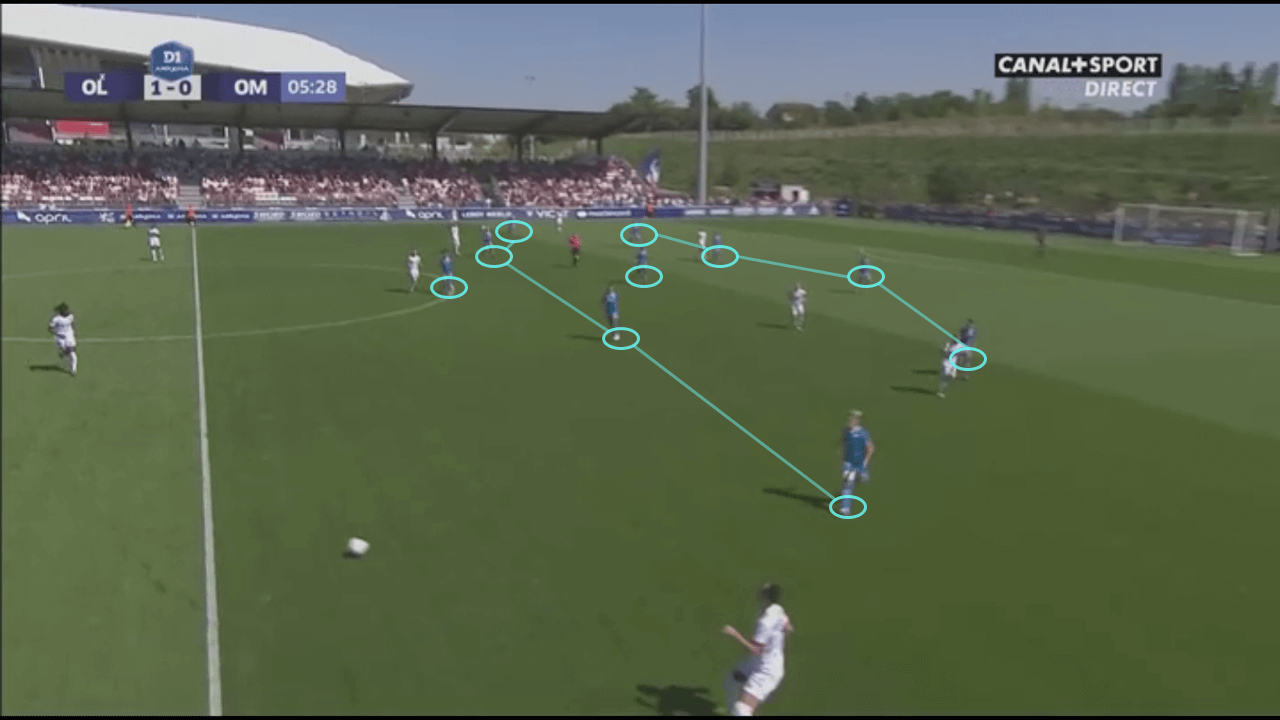
Upon winning possession of the ball they sought out their attacking players like Palacin and later Salomon and Nadjim. They looked to switch play to the wide areas and managed to reach the final third in a couple of instances but weren’t successful most of the while due to the heavyweights driving the Lyon midfield. They also lacked the technical ability to win the long balls against superior defenders such as Mbock Bathy and Buchanan. Throughout the game we saw Marseille constantly concede possession to Lyon’s effective pressing.
Lyon’s tactical overview
It is too early to dissect Vasseur’s game model to perfection, but a few movements and pressing patterns during this game sheds light on certain fundamentals that we would expect from Lyon.
Lyon lined up in a 4-1-4-1 formation. In the attacking phase, Lyon look to maintain possession from the back and build up quickly using their midfielders who drop deep into the half-spaces. The full-backs attack the width, and they seek to get the ball as fast as possible into the final third. Out of possession they sit in a mid-to-high press closing the spaces in-between and forcing the opponents into making errors. During transitions, they move the ball quickly and press aggressively to win it back.
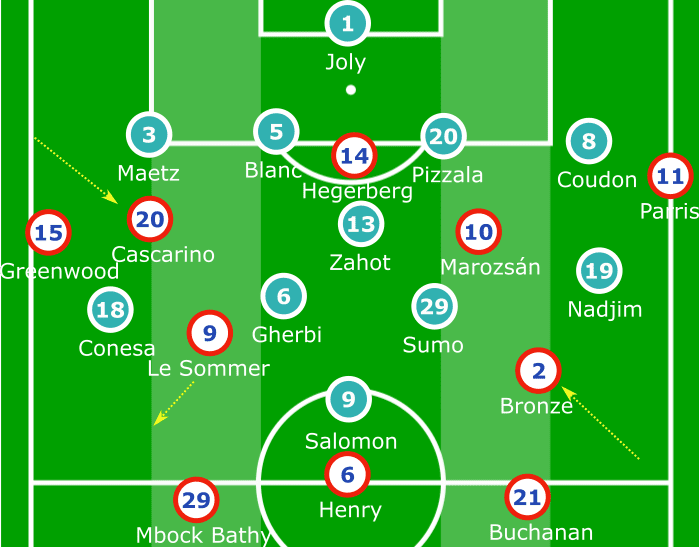
It is clear that Lyon possess the qualitative superiority over other teams in this league, especially Marseille. But they perform plenty of rotations in the midfield to create specific numerical and positional superiorities that makes them very dangerous.
Generating superiorities
Lyon attempt to circulate the ball while keeping possession and a high rhythm by having players drop into certain positions to create overloads. While playing out from the back, Henry often drops between the central defenders as an extra player while the two other midfielders, Le Sommer and Marozsán do the same, but in the half-spaces. This allows more freedom for the full-backs to dart forward or cut inside without risk of being hit on the transition.
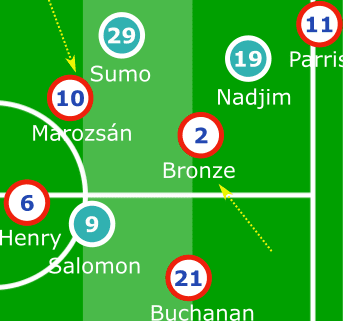
We see a similar rotation on the wings. It’s not just about the superior quality of players that Lyon has on the flanks or in the centre, but how they effectively utilise them. In this game we saw Cascarino often tuck inside into the half-space, playing between the lines, giving room for Greenwood to push higher up almost playing as winger. If the players around were tightly marked, Hegerberg playing as a striker would also drop deep to become the extra player for Lyon to constantly create superiorities over Marseille.
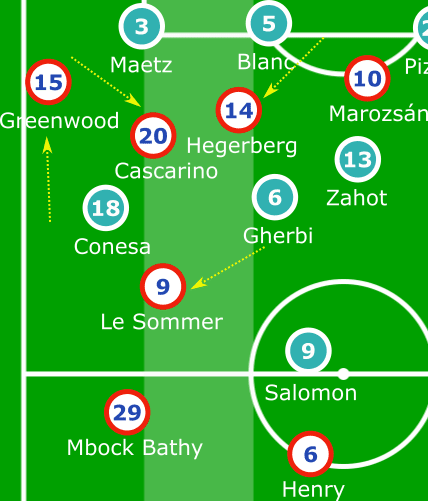
The third goal that Lyon scored in the first half is a perfect example of how they progressed with five passes from the defence to the final third of the pitch. With Cascarino playing in the left half-space, Greenwood pushed higher up on the left flank. Mbock Bathy was in possession of the ball, having received it from a switch of play from the right side. Holding on to the ball, she attracted the press from Gherbi. Le Sommer, having dropped into the space left by Greenwood was able to receive the ball beating Gherbi with a single pass.
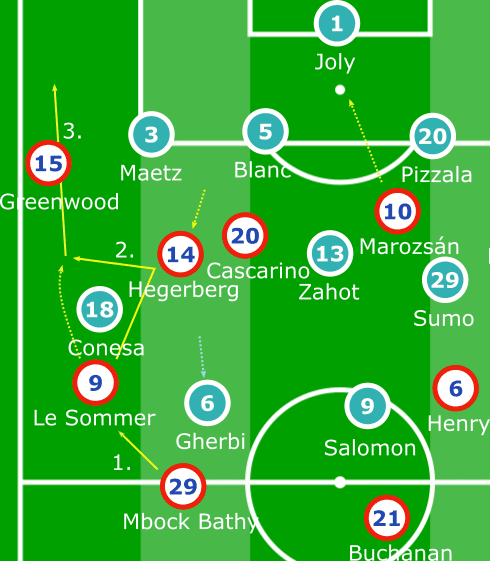
Now Hegerberg, the only unmarked player dropped deep to create an overload, and set Le Sommer up for a give-and-go, who then played it to Greenwood waiting on the far left flank. This move was able to surpass a tight defensive block set up by Marseille. Beating the full-back in a 1v1 situation, Greenwood was able to put the cross in early for Marozsán to finish.
Use of full-backs
Lyon’s effectively utilised their full-backs in generating width during possession, creating overloads and hitting early crosses in for the forwards. Lyon had two different profiles of full-backs from England on the right and left side.
On the right, we saw the experienced Bronze. Bronze is well known for picking the right moment to make underlapping runs inside the right half-space utilising the width generated by the winger ahead of her. This was precisely seen in this game in her partnership with fellow countrywoman Parris. By creating this overload, she would be incredibly hard for the opponents to track and mark.
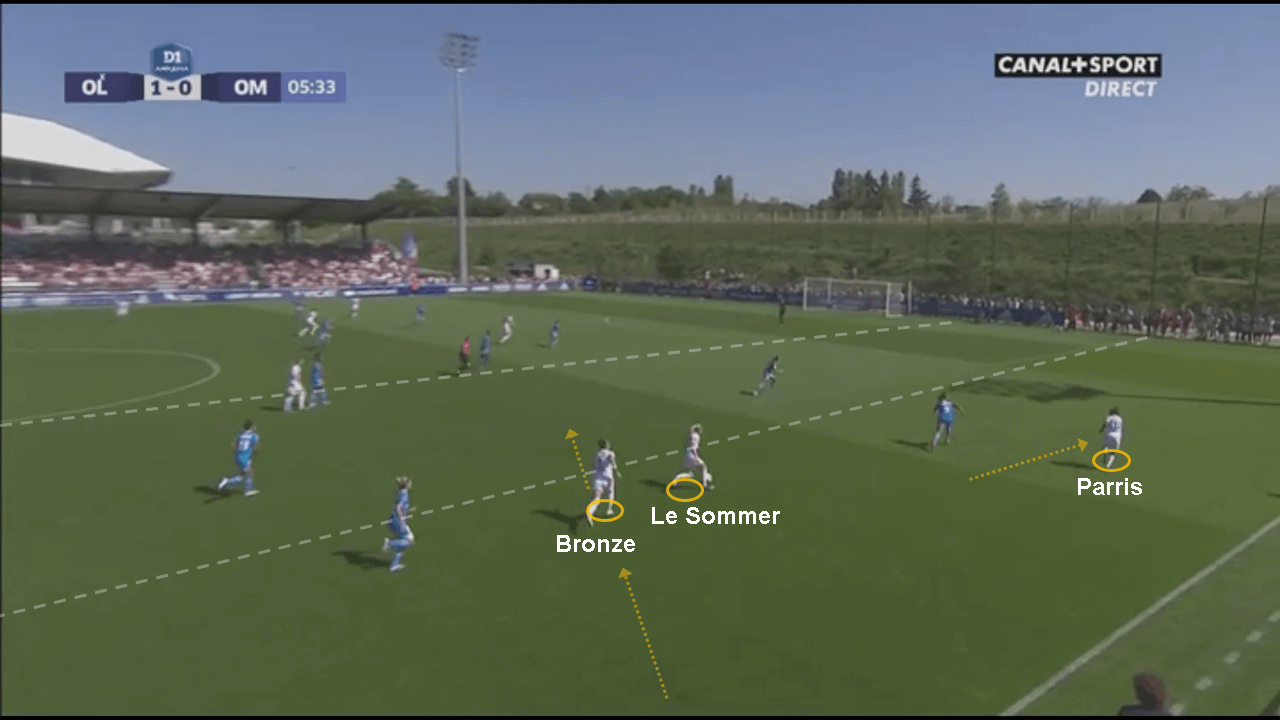
On the left side, we saw the effective combination of the left-footed Greenwood with her right-footed winger Cascarino. Greenwood’s qualities are her pace and aggression. While Cascarino played as an inverted winger filling in the spaces between the lines, Greenwood would substitute her position as a wide winger higher up awaiting a through ball or a switch of play.
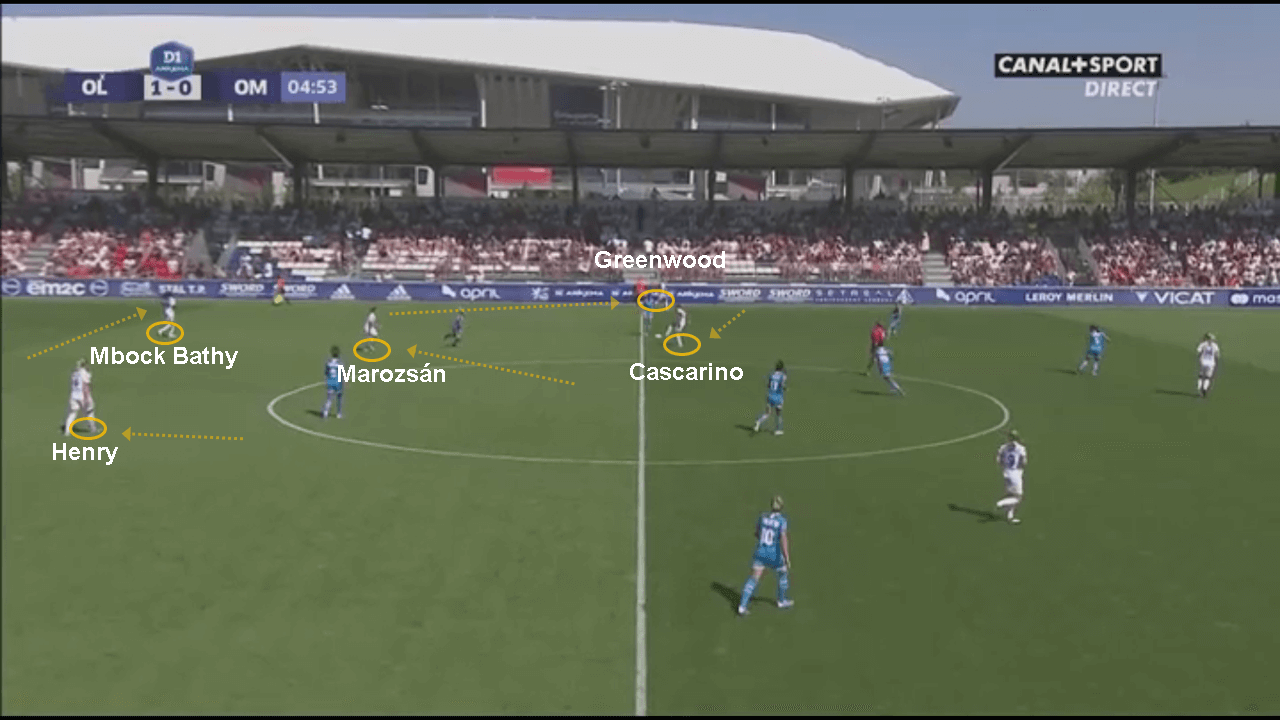
If the full-backs were given so much positional freedom it was because Marseille lacked the pace and technical ability to exploit the spaces behind them as they pushed forward often, and also thanks to the midfielders like Le Sommer and Marozsán with excellent tactical intelligence to drop deep and build play alongside Henry in the centre of the pitch.
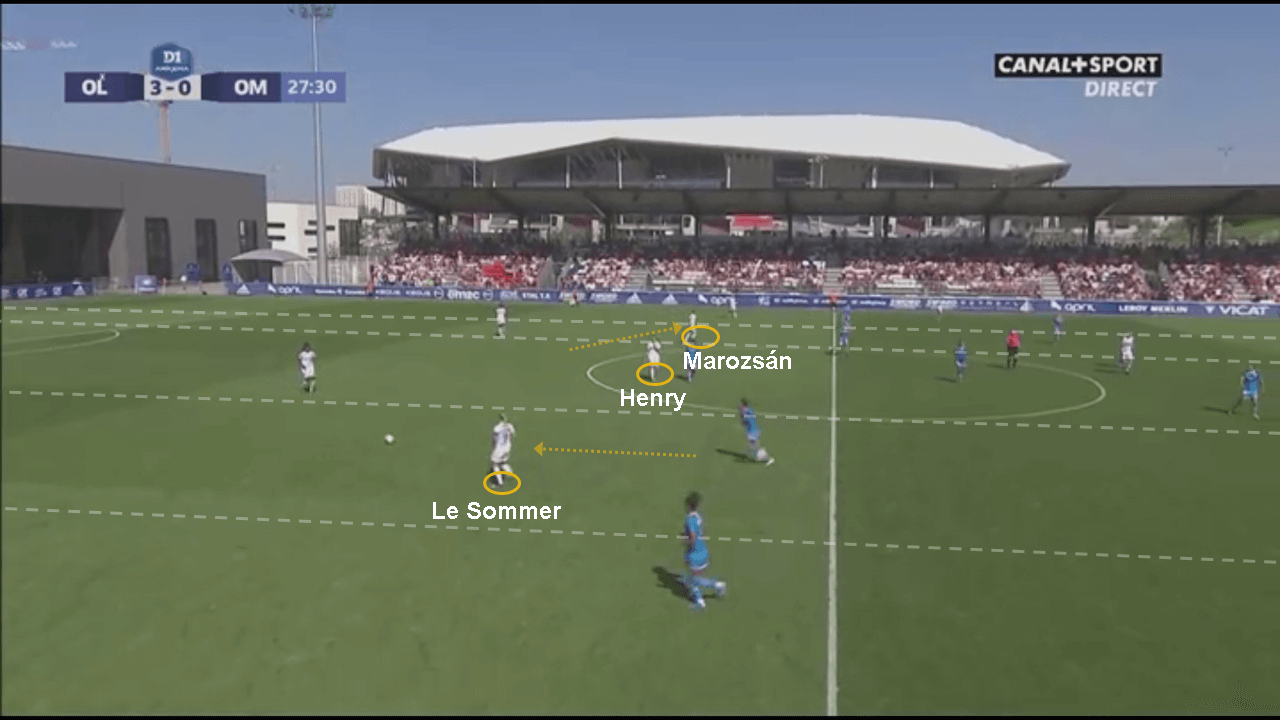
Exploiting spaces between the lines
It was interesting to note how Lyon attempt to break Marseille’s low block by positional play.
Each time Lyon started out from the back in building up their attack, they made sure they had players positioned between the lines of the opponent’s defence, preferably in the half-spaces where they held maximum threat. The advantage of positioning in these half-spaces was that it was difficult for the opposition defenders to make a decision whether to press them, breaking their line or hold back and wait for their midfielders to react. This kind of positioning also allowed them to connect easily with one of the wide players attacking the flanks, or the forwards. Hegerberg was often one of the forwards who positioned herself between the lines.
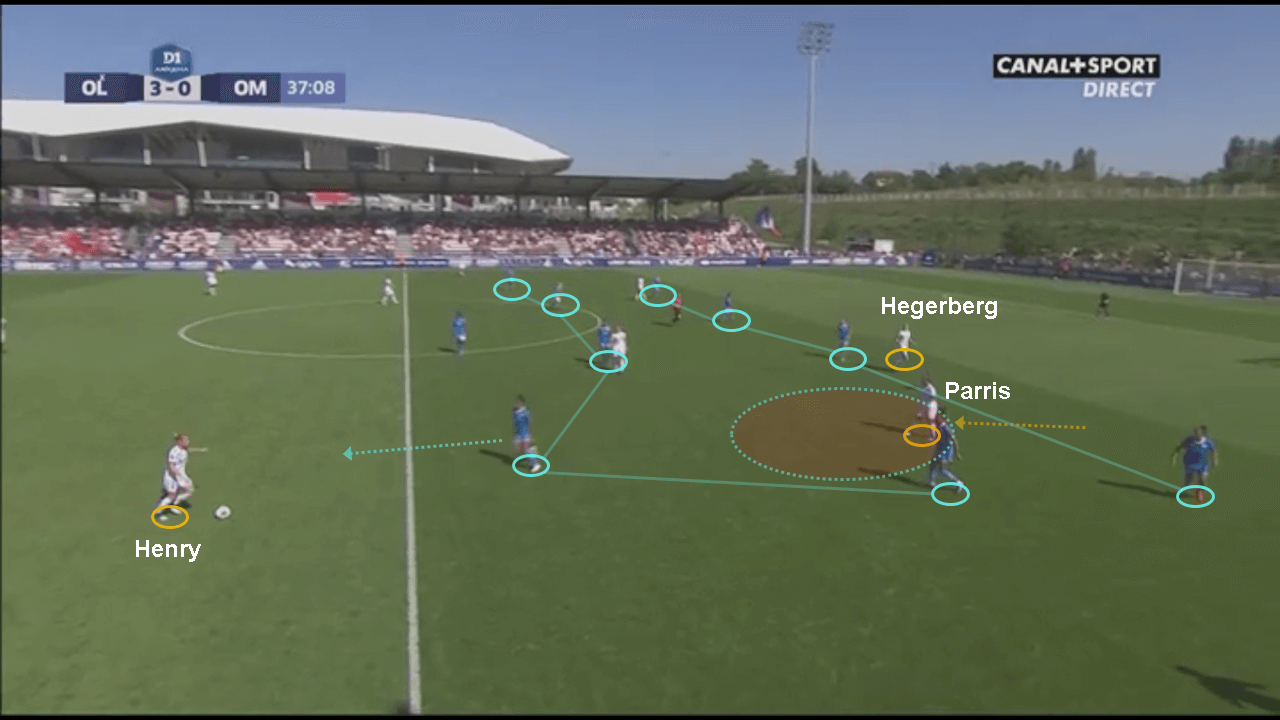
Should the space be too small for a player to receive between the lines, it was easy to attack the space behind the defence instead and thus continue the attack while pushing forward. This type of positional play helped Lyon constantly put Marseille on the back foot and create chances. For the opportunities they created in this game, the score could have well been in double digits had it not been for the forwards who were still rusty with their finishing returning from preseason. We expect their xG’s to improve substantially as the weeks progress.

Defensive decisiveness
Lyon’s mid-to-high press with the quality of players that they fielded made it impossible for Marseille to play out from the back. Hence, often they would trade a couple of passes and look to launch the long ball in behind Lyon’s defence. Playing with a rather high line, there were two aspects of Lyon’s game that enabled them to deal with these aerial balls.
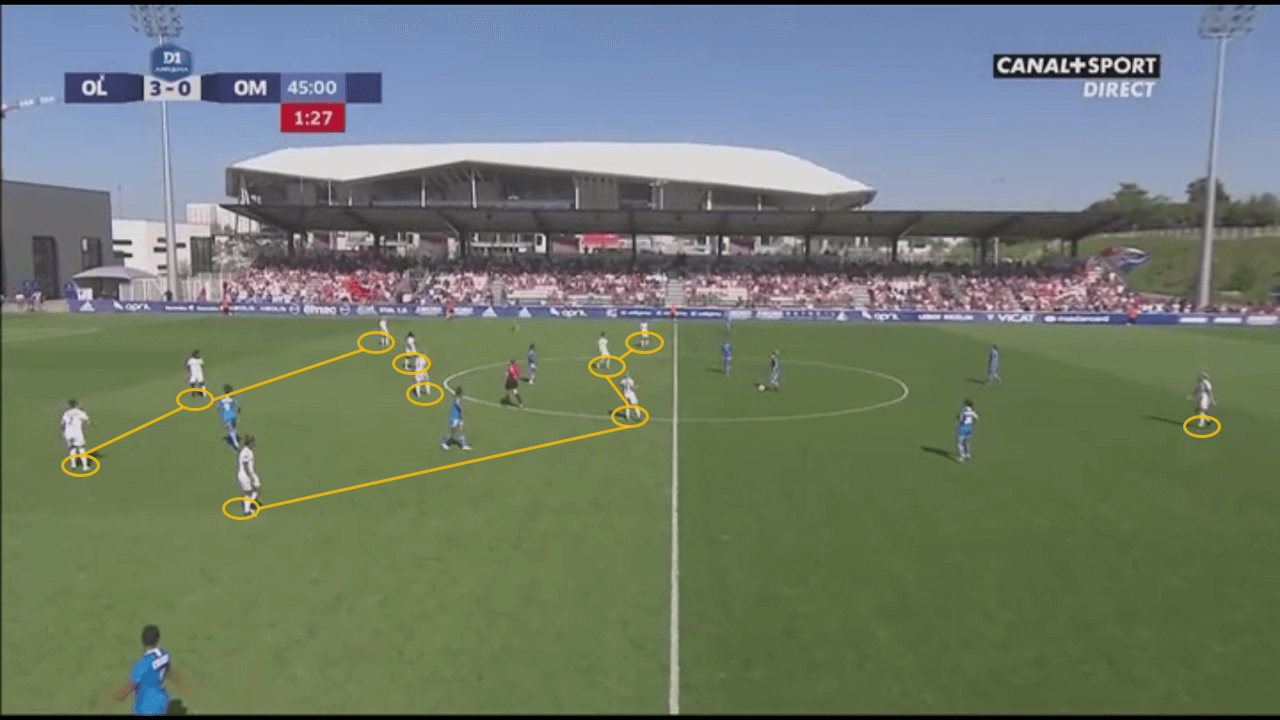
Bouhaddi, the goalkeeper often played outside her box, as a libero to pick up the lose balls. She found herself at the end of a couple of balls that came in floating behind the defensive line that was easily over 30 metres from the Lyon posts.
The defensive pair of Mbock Bathy and Buchanan was easily able to deal with all aerial duels during the game. But the early anticipation and decisiveness of Mbock Bathy played a big part in Lyon’s attacking game. Often in defensive transitions, she was quick to leave her line and attack the ball putting immense pressure on Marseille’s forwards or win the aerial balls to win possession and initiate a counter-attack. Mbock Bathy, breaking away with intent and confidence formed the heart of the Lyon defence as she singlehandedly dealt with all incoming threats during the game and combined with the midfielders, Le Sommer, Henry and Marozsán.
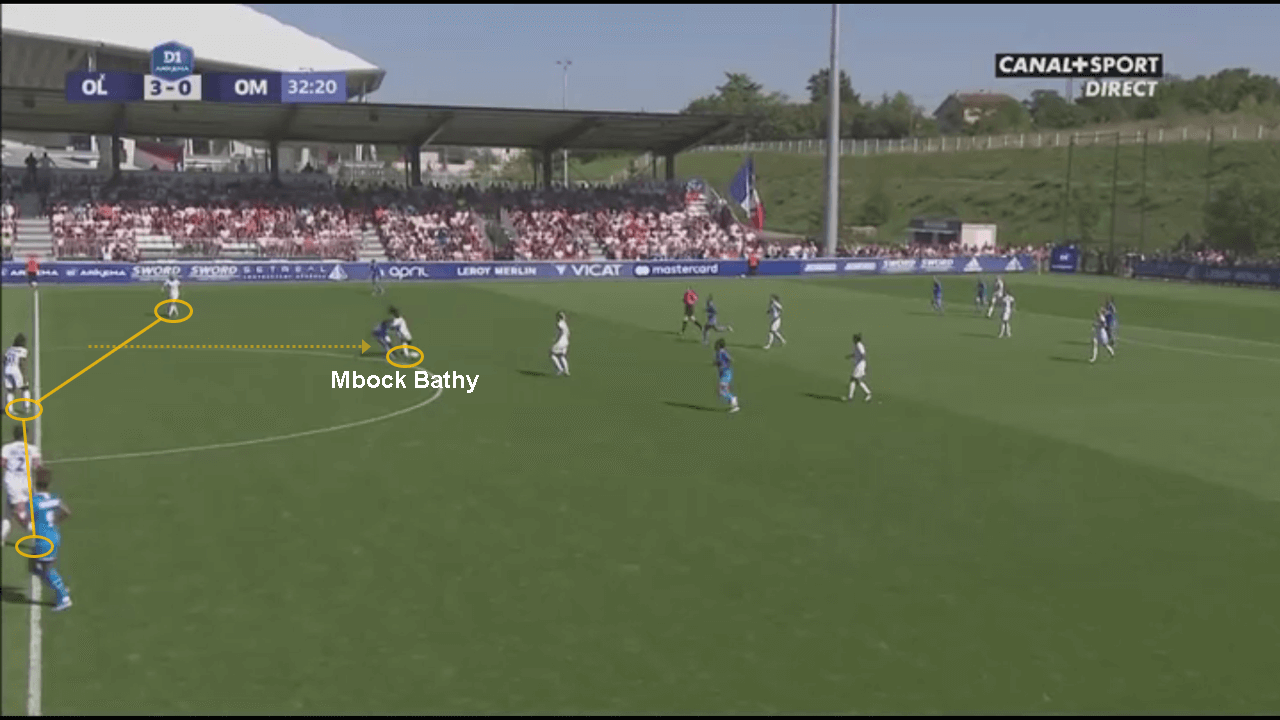
Conclusion
Lyon netted six goals against Marseille who were playing with 10 players from the hour mark. Hegeberg registered two to her tally in the first game of the season, while three of these goals were a direct or indirect result of the quality of crossing from Marozsán.
The likes of Amel Majri and Wendie Renard to add to this already spectacular squad shows that Lyon suffer no dearth of quality in every position on the pitch. Along with Dutch international van de Sanden and Japanese international Kumagai to compete for places in the lineup, the bigger challenge for Vasseur would be squad rotation throughout this season.
The difference in level is substantial between the European champions and the rest of the teams in the D1 league. Marseille will have plenty of opportunities to work on their game against more even teams. Amandine Blanc showed tremendous character in this game despite being sent off, and together with Pizzala are a great defensive unit for the southern French side. As for Lyon, only time will tell if their quality players are up to the test against more formidable teams like PSG in the D1 or others from Europe in the Champions League.
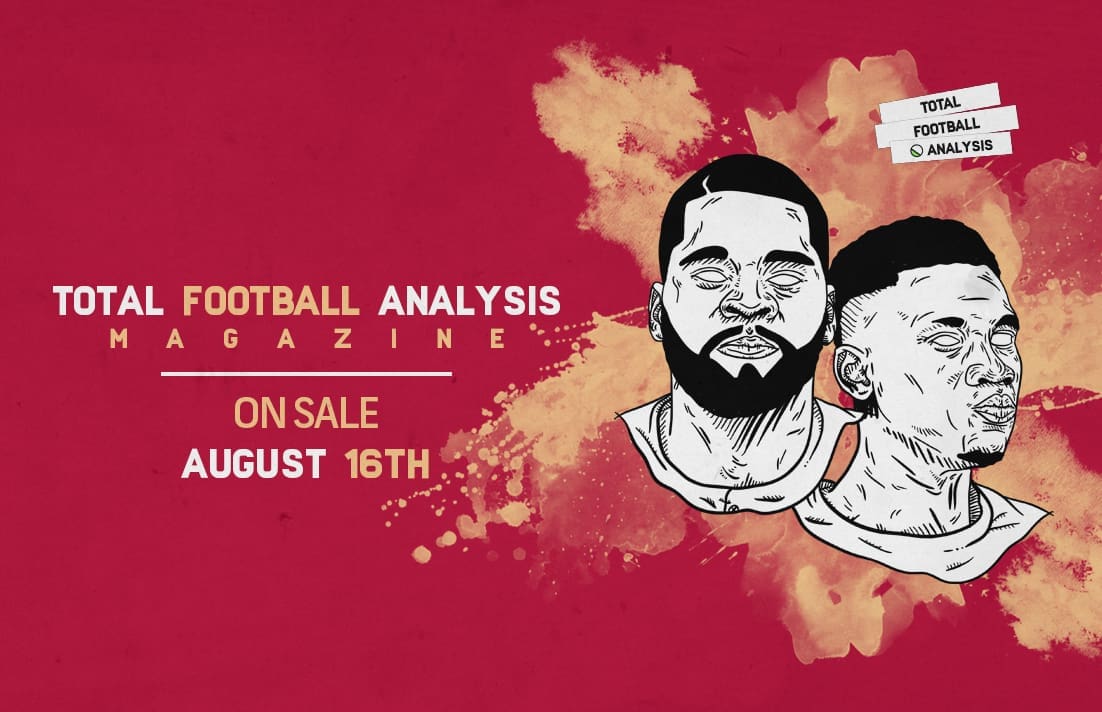
If you love tactical analysis, then you’ll love the digital magazines from totalfootballanalysis.com – a guaranteed 100+ pages of pure tactical analysis covering topics from the Premier League, Serie A, La Liga, Bundesliga and many, many more. Buy your copy of the August issue for just ₤4.99 here.

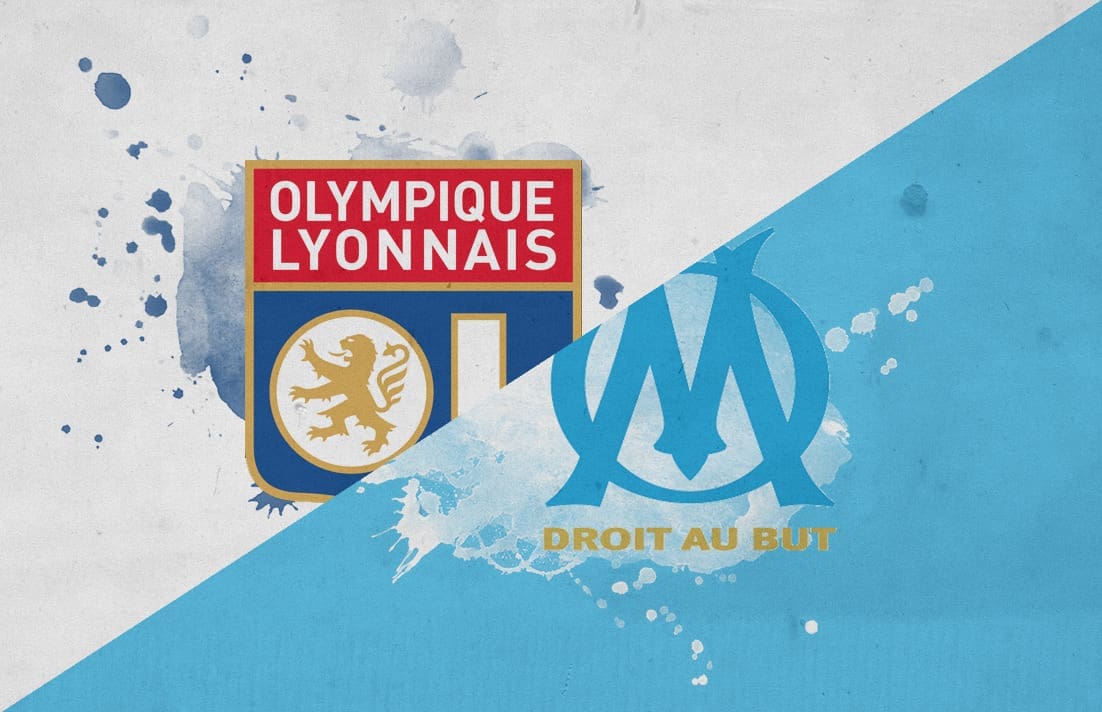
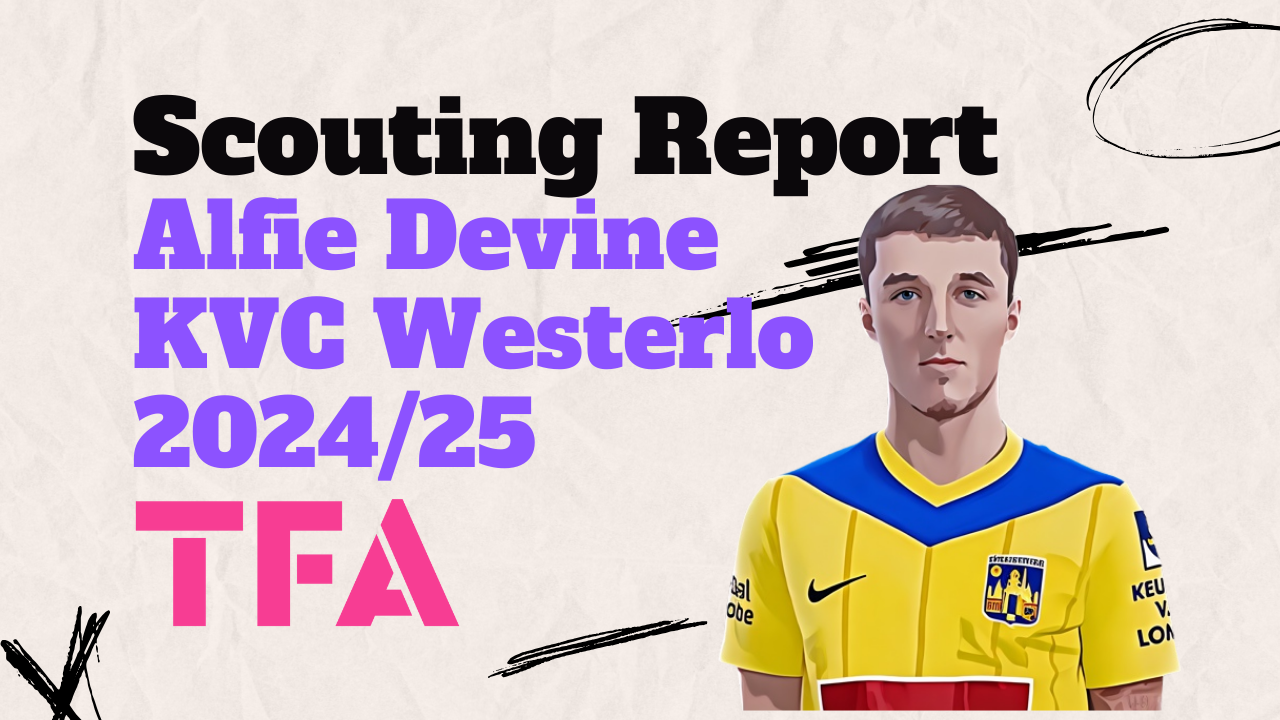

Comments